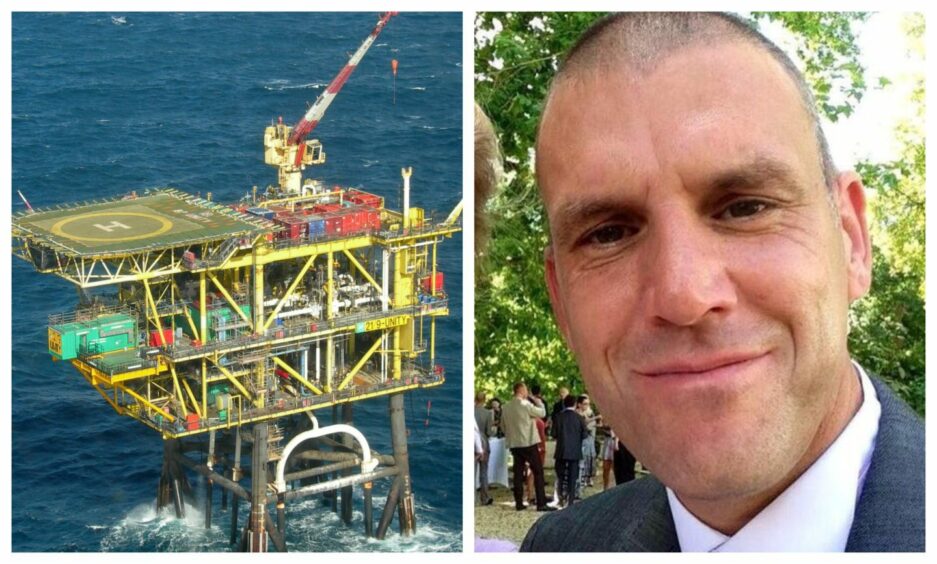
A renowned disaster expert has given evidence at BP’s trial against the Health and Safety Executive.
BP is denying any breach in safety rules following the death of Sean Anderson who fell through an open grating on its Unity Platform in 2014.
Chartered engineer Rod Sylvester-Ewen, 70, told Aberdeen’s sheriff court that he has more than 48 years of experience in oil engineering and risk assessment, and was the Piper Alpha inquiry’s technical expert.
Sean Anderson had been employed by Cape Industrial Services to carry out fabric maintenance work on Unity and had been tidying up an area of lower deck of the platform when the accident happened at 4am on September 4, 2014.
The 43-year-old multi-skilled scaffolder fell about 72ft (22m) through an open hole on the rig’s deck into the water below, suffering fatal head injuries.
BP’s defence counsel Murdo Macleod KC asked Mr Sylvester-Ewen if a work permit should have been issued for the task, and he replied: “No, it was house-keeping – at most it would be seen as a low risk activity.”
Mr Sylvester-Ewen was also asked to comment on the HSE’s five precautionary measures they said could have been taken following its investigation into the incident – those being adding safety netting; use of the gate to the open deck work area; signage; coverings for open gratings and addition of temporary scaffolding.
He told the court the netting under the Unity’s deck was “not fit for purpose” in his view and should not have been considered as a safe guard, adding that the gate had “no relevance” to the incident.
With regard to having no signage attached to the barrier over which Mr Anderson fell, he told the court that a “plethora” of signs “would be ignored”, adding: “The golden rule of – do not cross a hard barrier – is much easier to understand.”
The court heard that Mr Sylvester-Ewen thought the replacement of the grating covering would lead to “greater risk” because of the number of times it would have to be put back and lifted on each two-week working pattern.
He said any temporary covering over the open grating wold have to be properly lashed down, and again said this would increase risks of having to work in the constricted area, he explained: “There has to be a balance of risks – an effective barrier prevents anyone entering the Boxing Ring. That’s your line of defence.”
When asked if the HSE had since issued an alert to make these measures an industry-wide rule, he replied: “There was none issued.”
The court was told a Boxing Ring was the nick-name given to an area that had been squared off by scaffold pipes.
Fiscal Kristina Kelly asked Mr Sylvester-Ewen if the addition of a cover over the hole would have reduced the risk to Mr Anderson, he replied: “Only if it doesn’t add more risk. Using the barrier system and being clipped on eliminates the risk.”
He told the court that “human factors” meant some people would “not take notice of signs at all” and they could also easily get displaced, he reiterated: “It is better to have the golden rule – do not cross the barrier.”
The court was told the conditions that night had been foggy and dark and Mr Anderson had not been found wearing a life jacket, harness or survival suit.
Fiscal depute Kristina Kelly told the jury that Mr Anderson had been working night shifts during his stint on the Unity and had been part of a maintenance team contracted by Cape Industrial services who were carrying out scaffolding and rope access work.
A post mortem later showed the cause of death was serious injuries to his head and chest sustained as a result of a “descent into the sea” from the oil installation. It was recorded that he had suffered very severe and “predictably immediately” fatal head injuries, with extensive fracturing of the skull.
Toxicology results showed no signs of alcohol, drugs or gas poisoning – and no signs of natural diseases that would have resulted in his death.
Defence counsel Murdo Macleod KC said BP denies being in breach of the Health and Safety at Work Act.
The trial which is being heard by Sheriff Graham Buchanan, continues.